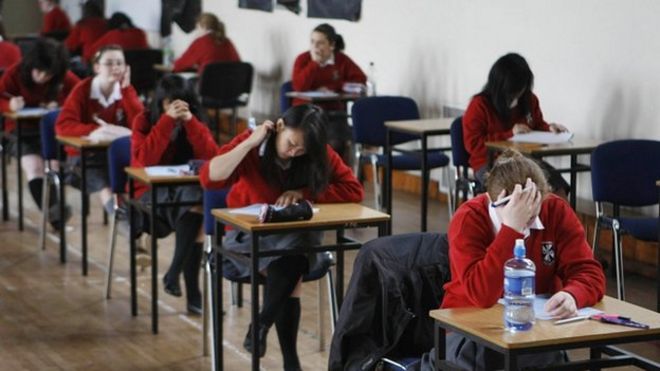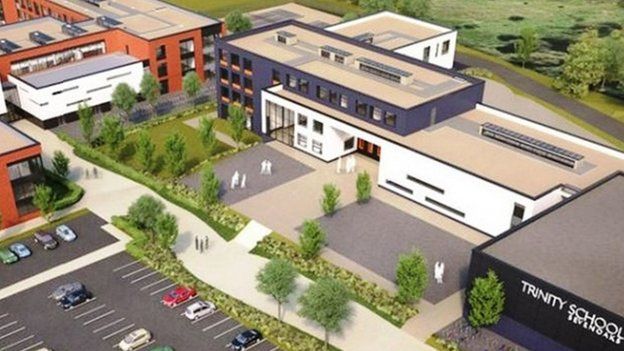1965年工党政府压力下取消Grammar school系统,英格兰硕果仅存的163所Grammar School就成了很多父母送孩子上中学的竞争目标,虽然每年考试成绩说明Grammar school的成功,但各界保守党工党政府都决定不取消现有学校也不建新的,1998年工党政府更是立法禁止成立Grammar School,这次教育大臣不知道用什么法律漏洞批准成立了新的Grammar School,Kent本来就有很多Grammar School估计成立新的被反对的也会小一些。
这个门开了以后,不知道以后别的地方还会不会有更多成立的。当然这只可能在保守党政府下有可能,工党的Jeremy Corbyn就因为漂亮年轻老婆要送孩子上grammar school所以和老婆离婚了,估计Grammar school出身的他肯定会强烈反对重建grammar school的吧。http://www.dailymail.co.uk/news/article-3127962/Labour-leadership-hopeful-Jeremy-Corbyn-left-wing-divorced-wife-refused-send-son-failing-comprehensive.html
想了解Grammar school系统和历史的可以参考这个贴 http://bbs.powerapple.com/forum.php?mod=viewthread&tid=2571658
First ‘new’ grammar school in 50 years
http://www.bbc.co.uk/news/education-34535778
http://www.independent.co.uk/news/education/education-news/first-grammar-school-in-50-years-to-be-approved-by-nicky-morgan-a6694631.html
http://www.mirror.co.uk/news/uk-news/first-new-grammar-school-50-6637400
http://www.thetimes.co.uk/tto/education/article4586345.ece
http://www.dailymail.co.uk/wires/pa/article-3273275/Nicky-Morgan-set-approve-new-grammar-school-50-years.html

England is to get its first “new” grammar school for five decades after it was agreed an existing school could build an “annexe” in another town.
Weald of Kent school in Tonbridge will open a site in Sevenoaks, Kent - side-stepping a ban on new grammar schools.
But Education Secretary Nicky Morgan said this would not “open the floodgates” to more selection and ruled out a change in legislation.
Labour described the decision as a “hugely backward step”.
The decision to allow the new grammar school site, with places for 450 girls, has raised expectations of similar bids in other parts of the country.
But Mrs Morgan said this was a “genuine expansion” of an existing school - describing it as “one school, two sites” - and it “does not reflect a change in this government’s position on selective schools”.
‘Statutory prohibition’
The education secretary said that the ban on new grammars would remain.
“I don’t want to fight the battles of selective and non-selective… This is one particular application with one particular set of circumstances. Why would I deny a good school the right to expand?”
I don’t think this will open any kind of precedent or floodgates."
Any bids from other grammar schools would still face the “statutory prohibition” on new selective schools and would need to “meet the criteria for being a genuine expansion”, said the education secretary.
The school in Sevenoaks is due to open in September 2017, after a long campaign by supporters.

Analysis
Sean Coughlan, BBC education correspondent
This will be seen as a symbolic reversing of the tide, after many decades in which grammar schools were seen as a receding emblem of the educational past, rather than an expanding destination for the future.
While this decision will be warmly welcomed by traditionalists in the Conservatives’ ranks, it will be a double-edged sword for the government. Their education reforms, promoting academies and free schools, have made a prime virtue of raising standards for all, rather than focusing on the academically most able. That policy sits uneasily beside a rejuvenated 11-plus exam.
When David Cameron had the shadow education brief for the Conservatives, one of his clearest steps was to distance himself from the ideological trench warfare of the pro and anti-grammar campaigners.
Ministers won’t want the return of grammars to drown out their education policy, so they will want to play down suggestions that this decision could open the floodgates to a wave of such satellite selective schools.
Labour passed laws in 1998 banning the creation of new grammars - which are selective state schools - but existing schools are allowed to expand if there is sufficient demand.
A previous plan for such an extension of the Weald of Kent Grammar School was turned down, when ministers were not persuaded that it would be a branch of an existing school rather than the creation of a new institution.
Image copyright PA
Image caption Artists’ impression of the grammar school to open in Sevenoaks in September 2017
Andrew Shilling, of the Sevenoaks Grammar School Campaign, said the decision was a “victory for parent power”.
“Today’s news is overdue recognition of the fact that a Sevenoaks grammar school is supported by the vast majority of local parents.”
In last year’s GCSE results, 99% of pupils at the Weald of Kent Grammar School achieved five A*-C grades.
Pressure on places
Local MP Michael Fallon welcomed the announcement as ending the “absurd situation of Sevenoaks being the only area in Kent not to have a grammar school”.
“It will also help to ease the growing pressure on school places in west Kent.”
But Ofsted chief Sir Michael Wilshaw says that while he backs the idea of a “grammar school ethos” such selective schools needed to “make sure they admit children from all backgrounds and particularly poor backgrounds”.
“Remember this - for every grammar school you create, you create three secondary moderns and I can’t see parents queuing up to send their children to more secondary moderns,” said Sir Michael.
There will now be an expectation that others among the 163 remaining grammar schools could seek to open branches in other towns. There are some local authorities, such as Kent and Buckinghamshire, which have retained grammar school systems.
Image caption Sir Michael Wilshaw: “For every grammar school you create, you create three secondary moderns”
There has been a strong campaign by some Conservative MPs for greater availability of grammar schools, arguing that they drive social mobility by providing high-achieving schools for bright pupils, regardless of where they live or family income.
Grammar school supporters will see this as a symbolic boost for a type of school that was phased out in most parts of England more than 40 years ago.
Grammar schools
[ul]
[b]* There are 163 grammar schools in England, admission by academic exam, non-fee paying
-
There were almost 1,300 in the mid-1960s, teaching about 25% of pupils -
In 1965, the education department told local authorities to convert to a comprehensive system -
It was not compulsory and some authorities retained grammar systems, including Kent -
Since the late-1970s about 5% of pupils attended grammar schools -
In 1998, legislation barred the opening of new grammar schools -
Supporters say they provide an opportunity for poor, bright pupils -
Opponents say grammar school intakes are disproportionately affluent[/b]
[/ul]
But opponents of selective education were highly critical.
Melissa Benn, of Comprehensive Future, said that academic selection at the age of 11 was “unfair, unnecessary and divisive”.
Ms Benn said it was “absurd” to suggest that the school would be an annexe, rather than a wholly new school, adding the decision could have “far reaching consequences”.
Image caption Grammar school teachers in Brighton in a BBC documentary from 1959
Graham Brady, chairman of the Conservative backbench 1922 Committee and a prominent campaigner for grammar schools backed the decision.
“This is a small but positive step. It improves choice for parents,” said Mr Brady.
The Sutton Trust, which promotes social mobility, highlighted research that less than 3% of pupils in grammar schools were entitled to free meals, compared with an average of 18% in the areas they serve.
Shadow education secretary Lucy Powell claimed grammar schools do not improve social mobility.
Image caption Local authorities were told to switch comprehensive schools from 1965
“They do not increase equality of opportunity, they make it worse. Tiny numbers of children from disadvantaged backgrounds pass their tests because they are the preserve of the privately tutored,” she said.
“That’s why Ofsted and educational experts are against their expansion. People have a romantic view of what the grammar school system is like but its just not the same any more.”
View comments
